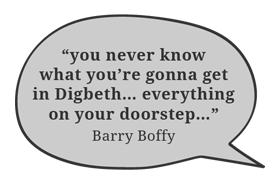Digbeth’s residential community is now significantly smaller in size than earlier in the 20th century. Sister Mary Joseph, who taught in Digbeth in the 1960s and 1970s, recalls that the area used to be more family-orientated until many residents moved to better housing elsewhere in Birmingham. Father Patrick Browne (St Anne’s) echoes this, explaining that Digbeth’s houses were demolished and replaced with apartments. He feels that this contributed to the decrease in the number of family households in Digbeth.
Digbeth has a reputation for being a place where the residential community has been replaced by groups of people who travel to the area to work, worship or socialise. Compared to previous decades, today Digbeth comprises more buildings with industrial or social functions than residential housing.
 However, Digbeth’s residential population is increasing. The Digbeth Residents Association (DRA) strives to create a sense of belonging and foster a sense of community. They work in partnership with businesses and represent the views of residents. Pamela Pinski (DRA) indicates that, whilst there may be fewer children in the area, the community is diverse.
However, Digbeth’s residential population is increasing. The Digbeth Residents Association (DRA) strives to create a sense of belonging and foster a sense of community. They work in partnership with businesses and represent the views of residents. Pamela Pinski (DRA) indicates that, whilst there may be fewer children in the area, the community is diverse.
Digbeth’s number of permanent residents is set to rise with the planned redevelopment of the area. Digbeth resident Barry Boffy says that the “sense of anticipation” that something is going to happen soon in Digbeth influenced his decision to move here two years ago. Echoing other interviewees who described the area as “run down” and “grimy”, Barry nevertheless thinks that it is primed for change and is certainly up-and-coming.
 Old factories are now frequently being turned into apartments, such as the one in which Barry lives, which is encouraging a thriving, permanent population to become established. For Barry, although it is within easy reach of the city centre, Digbeth has a unique, “independent spirit”, offering independent shops, artisan industries and a thriving art scene that is lacking elsewhere in Birmingham. In Barry’s words, living in Digbeth means that you have “everything on your doorstep”.
Old factories are now frequently being turned into apartments, such as the one in which Barry lives, which is encouraging a thriving, permanent population to become established. For Barry, although it is within easy reach of the city centre, Digbeth has a unique, “independent spirit”, offering independent shops, artisan industries and a thriving art scene that is lacking elsewhere in Birmingham. In Barry’s words, living in Digbeth means that you have “everything on your doorstep”.
However, some vox-pop respondents reveal that although housing redevelopment is welcomed, there is also a concern to preserve Digbeth’s “traditional” and “industrial” character. A number of people interviewed make clear that Digbeth’s industrial heritage is hugely important. One interviewee at the St. Patrick’s Day parade calls Digbeth “proper Birmingham” and another on a walking tour fondly describes the area as the site of “Birmingham’s origin”. Barry echoes this and hopes that the proposed redevelopments will bring sympathetic regeneration to the area, rather than demolition.